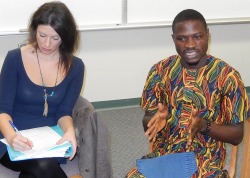First-hand interaction leads to learning with impact

When it comes to getting nursing students thinking about building therapeutic relationships with patients who have different cultural health beliefs and cultural traditions, Dr. Caroline Porr thinks first-hand interaction is the best teacher.
That's why the School of Nursing (SON) assistant professor invited several of Memorial's international students who come from countries around the world, such as China, Iran, India, Nigeria and Belize to chat with first-year bachelor of nursing students about birth and death rituals.
Dr. Porr, who's also the chair of teaching and learning in the SON, wants students to actively engage with people from other cultures and at the same time learn about cultural traditions they read about in their textbook. This is the third consecutive year that she has created this international classroom.
"The international students tell me how much they enjoy sharing with nursing students an d the students are fascinated with the stories that reflect different traditions and customs surrounding birth and death," she said.
"Nursing students get to ask questions right away, for example, about ceremonies during pregnancy and birth in India. Dipping a gold ring in honey and placing it on the newborn's lips is a Hindu tradition carried out to welcome and name the baby," said Dr. Porr.
"Overall there is fabulous engagement with tremendous respect and appreciation," she added. "It's a powerful opportunity for nursing students to learn what is important to remember when building therapeutic relationships with patients who may be celebrating a child's birth or grieving the loss of a loved one."
Dr. Porr's international classroom and focus on interactive learning is in keeping with the university's Teaching and Learning Framework.